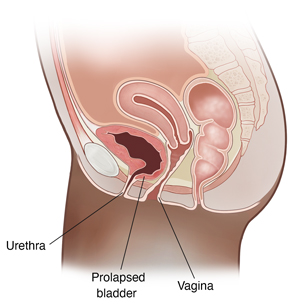A
B
C
D
E
F
G
H
I
J
K
L
M
N
O
P
Q
R
S
T
U
V
W
X
Y
Z
Click a letter to see a list of conditions beginning with that letter.
Click 'Topic Index' to return to the index for the current topic.
Click 'Library Index' to return to the listing of all topics.
Pelvic Organ Prolapse: Surgery for Cystocele
Cystocele occurs when the bladder sags (prolapses) into the vagina. The goal of surgery is to repair the problem. This will help ease your symptoms. Your surgery may include one or more repairs.

The surgical procedure
Cystocele can be treated with surgery done through the vagina. The sagging bladder is moved back into its normal position. Stitches are placed in tissue between the bladder and the vagina. Sometimes a graft or mesh is used to support the repair and help hold the bladder in place. Ask your surgeon if they are going to use mesh and what the risks are. In some cases, another type of surgery is done. It can help correct weakness in the front wall of the vagina. The vagina is attached to strong tissues in the side wall of the pelvis.
Possible risks and complications of this surgery
-
Infection
-
Bleeding
-
Risks of anesthesia
-
Damage to nerves, muscles, or nearby pelvic structures
-
Blood clots
-
Prolapse of the pelvic organ or organs occurring again
-
Vaginal pain or painful intercourse
-
Urinary tract infection
-
Urge incontinence
-
Urinary retention
-
Fistula. This is an abnormal connection between the bladder and the vagina.
-
Sac or pocket forms in the urethra (urethral diverticulum)
Online Medical Reviewer:
Donna Freeborn PhD CNM FNP
Online Medical Reviewer:
Heather M Trevino BSN RNC
Online Medical Reviewer:
Howard Goodman MD
Date Last Reviewed:
8/1/2022
© 2000-2024 The StayWell Company, LLC. All rights reserved. This information is not intended as a substitute for professional medical care. Always follow your healthcare professional's instructions.